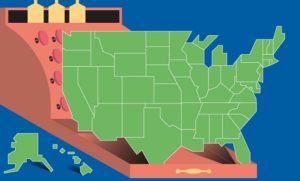What Do You Do When You Owe Taxes But Don’t Have the Funds?
For many people tax season brings the joy of a nice big refund to go out and splurge on something they’ve had your eye on for a long time. On the flip side of the equation are those people who surprisingly, or not, end up owing the IRS money. Not only do these people miss out on the extra cash influx, but they also have to come up with the funds to pay off the extra tax bill.
For some people, depending how high the bill is, they could have to pay even more than just the shortage amount. That’s because many times when people underpay they end up owing penalties for the underpayment. For those who owe a lot of money, those penalties could end up being huge. In fact, the penalties can even be much higher than the shortage.
That’s why it’s always best to try to avoid owing any money to the IRS, especially if you don’t have the funds to pay it off when the tax bill comes due. So what happens to people who can’t pay their tax bill? You do have a few options.
In some cases, it might be a good idea to take out a loan or a line of credit in order to pay off the bill. Of course, you will then be responsible to pay off the loan, so use caution. Another option is to apply for an extension with the IRS. This could buy you a little time to come up with the needed funds. If you need even more time then try applying for a hardship extension, which could give you up to six months to pay it off. You could also ask the IRS for permission to set up a payment plan to pay off the debt in installments.
Whichever path you decide to take, make sure you do something. Don’t ignore the problem or it will only get worse. The penalties will likely increase the longer you wait and the IRS could eventually take other measures or even press charges. So the bottom line is: do something.
Which States Take the Most From the Wealthy?
Which States Take the Most From the Wealthy? No one likes paying taxes. That being said, most people recognize the need for taxes. But they still do everything they can to keep their tax bill as low as possible. Minimizing taxes is especially important for the wealthy because they pay the majority of the country’s…
Are Changes Coming to Capital Gains Taxes?
Are Changes Coming to Capital Gains Taxes? If you’re still trying to catch up with all the changes brought about by the Tax Cut and Jobs Act, then you might want to have a seat. That’s because republican lawmakers aren’t done yet. At least, they don’t want to be. Lawmakers in Washington have been busy…
Seven Important Tips that will help you crush your next Interview
Seven Important Tips that will help you crush your next Interview 1) Learn about the company It’s important to do research on the company for which you are interviewing. Take some time to research the position, the company, the culture, and some perks/drawbacks of the job. You can often find out more about a job…
The Key Asset to Building Top Performers
The Key Asset to Building Top Performers Are you a manager, or a team leader? If you are, then one of your goals is likely building the best team possible. After all, in most work situations, leaders are only as good as the teams they lead. So how do you build the best team? What…




